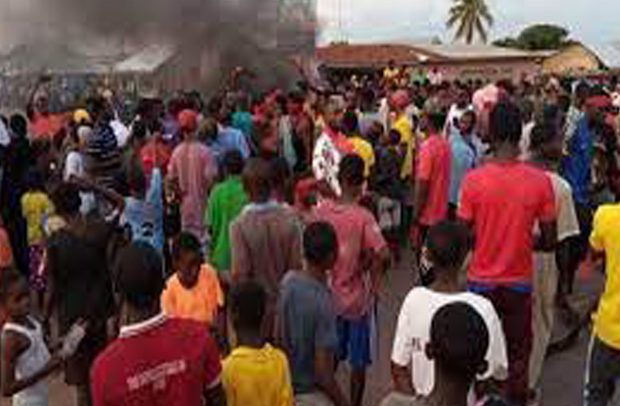The General Officer Commanding (GOC) of the Central Command of the Ghana Armed Forces, Brigadier General Joseph Aphur, has said the soldiers were compelled to pull the trigger during the violence in Ejura in the Ejura Sekyedumase District in the Ashanti Region last week because some of the protesters allegedly fired at the law enforcers.
“When we got to the general area of the cemetery, and they (protesters) started issuing warning threats to the police and military team; we started giving verbal warnings which we do in the military, but they didn’t listen. So we fired warning shots, and we realised that some shots were also fired from the crowd, at that stage, it was becoming too bad for civilians to be firing at the security personnel,” the military officer said.
Brig. Gen. Aphour was giving testimony before the three-member Committee of Inquiry under the chairmanship of His Lordship Justice George Kingsley Koomson of the Court of Appeal, yesterday.
The committee has been set up by the Minister of the Interior, Ambrose Dery on the orders of President Akufo-Addo, to hold public inquiry into the disturbances in Ejura on Tuesday, June 29, which left two people dead and four others injured following the murder of Ibrahim Mohammed, aka ‘Macho Kaaka’, a social media activist.
Returning Fire
According to the military officer, following the shots from the crowd, the soldiers returned fire to stop them.
“I think the commander, at that stage, then had to use minimum force by ordering his personnel to begin firing at those who were firing from the crowd to maim them,” he said, adding “After our fire, we didn’t have instant deaths. They were evacuated to the hospital, where we later heard two died. But at the instant of our fire, the crowd withdrew and everything came under our control.”
When asked whether the use of live ammunition during the protest was appropriate at that moment, the Commanding Officer said it was, and added that the situation could have been worse if they had not taken those steps.
“Of course, when you (security personnel) fire warning shots, and you see people firing from the crowd, certainly you have to use live ammunition to maim them, because we also arrested two persons with weapons that we have reported to the police.”
Minister’s Action
The officer also said the Ashanti Regional Minister’s decision to involve the military to calm the situation was a step in the right direction because the situation would have been worse.
“But if not for what we did together with the police in Ejura, I can bet you that there would have been more deaths to civilians,” he said, adding “if the chairman of REGSEC didn’t give good judgement, and I believe the judgement he gave by inviting us to intervene was the right one, there would have been more deaths.”
He disagreed with suggestions that the military should not be involved in civilian protests, saying “the committee should add in their report that the military should be called upon in situations like this. If not, there will be a time that we (Ghana), will be in a serious crisis and the military won’t intervene.”
Unfortunate Deaths
The Commanding Officer of 4 Battalion, Lt. Col. Kwasi Ware Peprah also testified, describing the incident and the subsequent deaths as unfortunate.
He told the committee that it was not the intention of the soldiers to kill any civilian, insisting that if that was the agenda, “we would have gotten not less than 100 people dying. It is just unfortunate.”
He then refuted the claim that the soldiers used live bullets to disperse the crowd, saying it would have been fatal if that was done, and said some protestors were also wielding guns and firing back upon the arrival of the security operatives.
Firing Into The Air
“You see, the soldiers started firing into the air, if you are not a professional and there are other guns firing you wouldn’t know. And that is how come some people are saying that they (the protestors) were not handling weapons.
“When an M16 rifle fires, I know. When a G3 rifle fires, I know but the ordinary citizen and the media wouldn’t know. All you will hear is gunshots into the air. And since it started when the soldiers came, you will assume that it is only soldiers who are firing,” he said.
Lt. Col. Peprah said the soldiers were not responsible for getting ambulances for casualties, insisting that “I think the Ejura administration as well as maybe the police should have considered the ambulance issue because we the Calm Life Operation are not structured that way, we only react to incidents.”
From I.F. Joe Awuah Jnr., Kumasi


